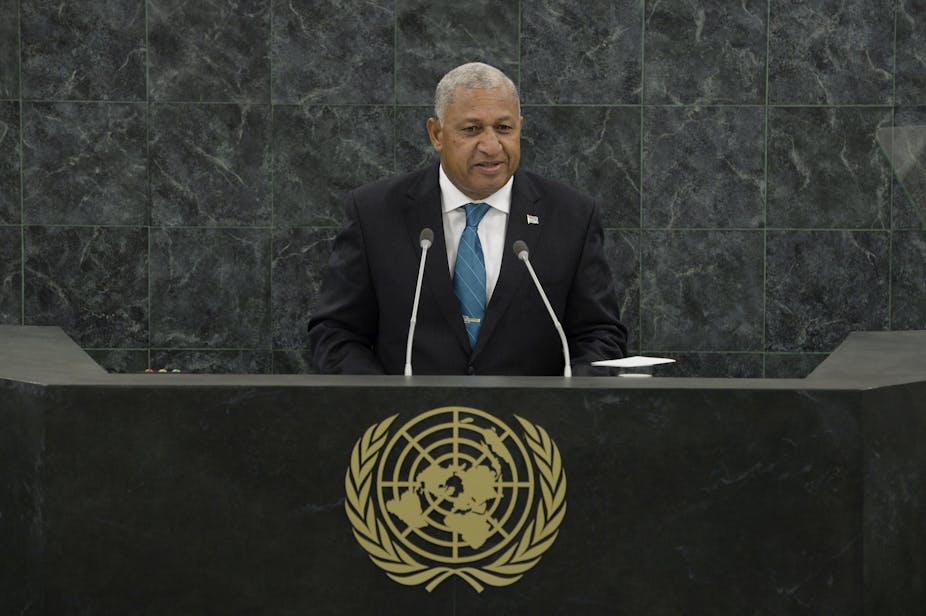Close your eyes and think of Fiji, and you’ll probably picture a luxurious South Pacific idyll set against a backdrop of honeymoon couples frolicking on white beaches and azure seas, being served by smiling natives. But over the past 30 years, Fiji has struggled to come to terms with post-colonial multi-ethnic complexity; the result has been military-led coups in 1987, 2000 and 2006.
And yet, in the country’s first elections in eight years, the people of Fiji have chosen coup-maker Voreque Bainimarama, who has ruled the country since seizing power in 2006, to take the helm of a democratic government.
To grasp the full complexity of this result and take stock of its implications, we have to grapple with the complexities of Bainimarama himself.
In again, out again
Here is a military leader who first tasted power during the putsch of 2000, nullifying the forces trying to overthrow the government of the day while assuming executive authority himself, then suspending the constitution and removing the existing government from power.
He was reported as agreeing that political power should remain in indigenous Fijian hands – and so Indo-Fijian prime minister Mahendra Chaudhry, a descendant of indentured Indian labourers, was ousted.
Yet in the 2000s, Bainimarama’s role was reversed; he staged a prolonged and public confrontation with the same government he had originally placed in power, and which had gone on to win the public mandate. He appeared to come out in favour of a multi-ethnic peace settlement, one that didn’t prioritise the interests of the indigenous Fijians over those of their Indo-Fijian brothers and sisters.
The 2006 coup was therefore unprecedented in Fiji’s modern history for not being an “ethnic” coup; instead, it laid bare the intra-Fijian struggles for power that have always been a dynamic part of indigenous life, but which were long muted under British colonial rule.
From strongman to steady hand
Between 2006 and the 2014 election, Bainimarama’s public profile has grown ever more complicated. Among other things, he is accused of human rights violations and of muzzling the media; when the judiciary ruled his leadership illegitimate, he resorted to ruling via decree.
And yet, under the aegis of military dictatorship, Bainimarama has done something remarkable: earned a democratic mandate.
Some of the reasons this has happened are obvious. There’s no ignoring the part infrastructure-building has played in securing Bainimarama’s success: roads, bridges, schools, hospitals, water, electricity are now not scarce or poor-quality commodities, but a part of people’s everyday lives. Targeted improvements to these basic services has done much to earn the former military dictator people’s trust.
But above all, he has done much to dismantle the deeply institutionalised ethnic divisions that have structured Fijian society and politics – as well as the imagination of its people – since the colonial era.
We’re all Fijians now
Every citizen of Fiji is now Fijian. Unlike previous elections, the 2014 ballot did not restrict people’s votes to political candidates within their own ethnic group. Fijians responded by giving Bainimarama a mandate to continue in power, this time with the full cachet of a democratically elected leader.
This does not mean that the democratic election of Bainimarama on a platform of equality and meritocracy – the same platform he used to frame his 2006 takeover as “the coup to end all coups” – has laid all the ghosts of Fiji’s ethnic past to rest. That would be impossible; ethnicity has been the main fault line of identity in the country for too long. Even as many Fijians have shielded their Indo-Fijian brothers and sisters from ethnic violence during the country’s various coups, these same Fijians have felt a sense of pride in ruling their own nation.
Fiji’s future is far from certain, and it would be ridiculous to imagine or expect otherwise: here is a country in only its fifth decade of independence, still repairing a deeply complicated multi-ethnic social fabric it inherited from its colonial rulers.
But while Fiji is certainly struggling to find a way forward and decide how or whether to accommodate a range of cultural rights, indigenous rights and human rights, the world beyond is hardly any closer to reaching consensus or peace on these issues.
This election has empowered the people of Fiji to rally behind a leader who can take them forwards. Like Bainimarama himself, Fiji’s future will be complicated and difficult – but there is real cause for optimism.

